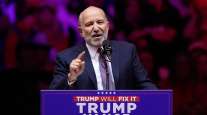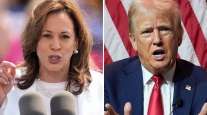Trump Plans to End Key Trade Preferences for India, Turkey

President Donald Trump announced plans to end key trade preferences for India and Turkey, in the latest move by the United States to counter what it calls unfair trade practices.
Trump notified Congress on March 4 in letters of his “intent to terminate” trade benefits for both countries under the generalized system of preferences. The notification starts a 60-day countdown before the president can take the action on his own authority, the U.S. Trade Representative’s Office said in a statement.
Their designation under the program allows duty-free entry of about 2,000 products including auto components, industrial valves, and textile materials. The president still can walk back his notice to terminate the preference programs if the two countries satisfy the concerns of his administration.
India was the largest beneficiary of the program in 2017 with $5.7 billion in imports to the United States given duty-free status and Turkey the fifth largest with $1.7 billion in covered imports, according to a Congressional Research Service report issued in January.

The duty benefit to India on exports under preferential treatment was “relatively limited” at $190 million, and its withdrawal won’t have significant impact, India’s Commerce Secretary Anup Wadhawan told reporters in New Delhi on March 5.
Indian stocks gained, recouping earlier losses, as investors looked beyond Trump’s plans to end key trade benefits for the country to focus on the national ballot due by May.
The United States said in April it would review India’s eligibility for the generalized system of preferences program after some U.S. companies said dairy and medical devices shipments to India were being hurt by nontariff barriers. Trump said in a notification letter that India “has not assured the United States that it will provide equitable and reasonable access to the markets of India.”
Despite high-level talks over the past year, India had showed little inclination to budge, Richard Rossow, senior adviser and Wadhwani chair in U.S.-India policy studies at the Center for Strategic and International Studies in Washington, said in an e-mail.
“Ideologically, I understand why the U.S. felt it had to revoke GSP. Nothing else worked,” Rossow said. “I hope this trade spat doesn’t end up and spill over into the real world,” he said, noting “trade tensions could escalate further in the coming days.”

Dhiraj Singh/Bloomberg News
India’s goods exports to the United States stood at $48 billion in 2018, growing 13% on year, according to India’s commerce ministry. India’s trade surplus of $21 billion with the United States made the treasury keep the South Asian nation on a watch list of currency manipulators.
To avert a trade war with the United States, India had deferred the imposition of retaliatory tariffs on 29 imports in response to duty increases o a range of products. Muted exports amid a global slowdown and tariff wars have added to risks in Asia’s third largest economy.
India had worked out issues with the United States, but there was an additional demand of reducing tariffs, said Wadhawan, adding the $2.6 trillion economy had to be conscious of its development concerns and can’t compromise on affordability of medical devices.

India Prime Minister Narendra Modi (T. Narayan/Bloomberg News)
Trump said in a separate letter that Turkey is no longer a “developing country based on its level of economic development.”
Trump’s decision comes at a difficult time for India’s prime minister, Narendra Modi. He faces a general election in a few weeks even as the long-standing animosity between India and Pakistan has escalated into violent clashes that could lead to all-out war.
Trump has had several disagreements with Turkey’s leader, Recep Tayyip Erdogan. His country’s once-robust economy has weakened, and that likely will be a key issue in local elections at the end of the month.




